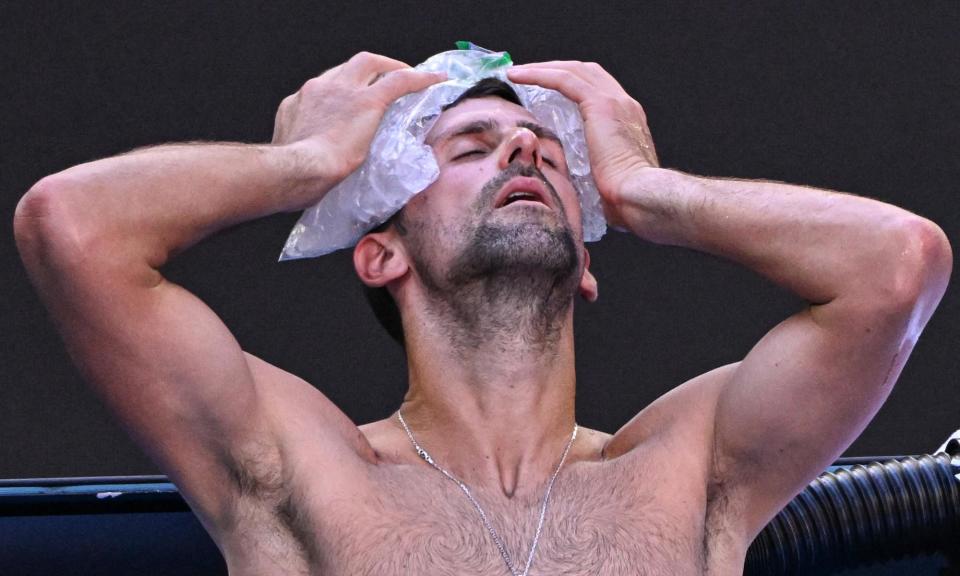Sport and the climate emergency: collating injustice with an action plan

If Madeleine Orr had been searching for a launch pad for her book, Warming up: How Climate Change is Changing Sport, last week provided the perfect rocket boosters. Only two years after the Fifa president, Gianni Infantino, brandished a “green card for the planet” in a video message, football’s world governing body signed a four-year sponsorship deal with the Saudi oil and gas conglomerate Aramco, the world’s largest corporate greenhouse gas emitter, the third biggest carbon emitter since the industrial revolution (behind China’s state coal company and the former Soviet Union) and one with plans, alongside other fossil fuel companies, to expand production in the face of overwhelming scientific evidence to the contrary.
“A comedian couldn’t write that,” says Orr over the phone from North Carolina. “It is textbook greenwashing. I’m kind of sad that I didn’t put it in the book as case study No 1. But it is a practice that has been going on for 100 years.”
Related: If women’s football cares about the climate crisis it must cut ties with Barclays | Katie Rood
Not that there is any shortage of ammunition for Warming Up. The heightened pace of the climate emergency is touching every aspect of sport – from the flooding of sports grounds in the UK, to the melting of snow essential to winter sports, from choking air pollution to the extreme heat threatening the lives of athletes around the world. Throw in sports’ own carbon footprint, its cosying up with big oil, alongside its unique ability to communicate, and you have a hell of a story, even if it is a bleak one.
Orr never intended to be working in the sport and climate sphere. She saw herself in events management, maybe at a COP summit, banging heads together. She isn’t a sports geek. But she spent a gap year in 2015 working in the French Alps only to find that the snow wasn’t there and early season injury rates were unusually high as people crowded on to the few runs that were open. She herself badly damaged both knees. It took only a few clicks to work out the connection between what she was seeing in front of her eyes and the climate crisis. And the more she looked, the more she found.
Warming Up collects these stories, big and small, and weaves them together into a narrative that couldn’t be a bolder, more forthright SOS for sport. What, in the whole of the dark morass, alarms her the most? “I’m very alarmed by everybody’s lack of alarm, that’s the scariest thing for me. In many of the communities that I visited, the level of alarm is off the charts because they are experiencing it, the heat that killed their son, the flood that ruined their community. To those privileged enough not to be badly affected, it is too easy to ignore. People think: ‘It hasn’t happened to us, it probably won’t.’ But you just can’t make that assumption.”
Her slight distance from the sports world allows her a clearer eye. “Sport has been in my life my whole life, my dad had the hockey on, I played sport myself but it wasn’t everything to me. It brings people together to have a good time, it is good health practice, it teaches kids to win graciously – that’s what draws me to it. I’m almost like an anthropologist. I can talk shop with the best of them but I don’t assume sports are great as my starting point.”
As well as documenting the endless ways in which sport has been affected by the climate emergency, and the inevitable injustice which means the most vulnerable are the most affected, Orr is good on mitigation – heat stroke, for example, is preventable, protocols are not hard and not expensive. Just expanding the length of the water break in tennis, having a wet towel round the neck for a few minutes is enough, she explains. It doesn’t have to be a wholesale stoppage of everything all the time.
Related: Mathieu Flamini: ‘Football needs to stand up for climate change’
I ask her for her three-point plan. Two of them could be done tomorrow. “Every sport in the world has a lightning policy,” she says, “make that a heat and air quality policy, too. The data is there. Secondly, no more fossil fuels in sports.” Her third wish is more existential, vital, and will meet more resistance. “There needs to be a plan around how sport continues into the future and matures. We have been in a pattern of growth for 75 years. At some point, in some markets, that is going to have to be reconsidered.
“The problem is unrelenting growth at the expense of people and the planet. I would draw a distinction between elite male professional sport and, for example, youth sports. We have to start thinking about carbon budgets: men’s pro sport is already at their carbon budget.
“The whole system has been based on performance on the field and the bottom line for so long that we’ve forgotten about everything else. I get the fightback against all of this, I want sports to be an escape and a happy news story – but here we are.”
Warming Up: How Climate Change is Changing Sport by Madeleine Orr publishes on 9 May (Bloomsbury) in hardback, ebook and audiobook. Available to order now. To support the Guardian and the Observer buy a copy at guardianbookshop.com. Delivery charges may apply.

